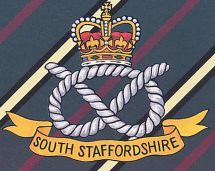Thursday, April 13, 2006
Remembering the Rising - Civilians killed by Sth Staffordshire Reg.
 Continuing United Irelander's look back at key events from the Easter Rising, today I will highlight the murderous activities of the South Staffordshire Regiment who were directly responsible for the deaths of 15 innocent Irish civilians during the Rising.
Continuing United Irelander's look back at key events from the Easter Rising, today I will highlight the murderous activities of the South Staffordshire Regiment who were directly responsible for the deaths of 15 innocent Irish civilians during the Rising.The Easter Rising began on Easter Monday but by Friday, it was apparent that the end was near. The GPO was in flames and the Volunteers were forced to evacuate. Pearse and Connolly were the last to leave. As the GPO was burning, British General Lowe ordered a savage frontal attack. This last battle was fought for King's Street, near the Four Courts and it took some 5,000 British soldiers, equipped with armoured cars and artillery, 28 hours to advance about 150 yards against some 200 rebels.
The fighting was fierce and it was at this time that the South Staffordshire Regiment took out their wrath on the civilian populace by bayoneting and shooting innocent Irish civilian men who had been hiding in cellars. In all, 15 civilians were murdered by them.
In the summer of 1916, the British Prime Minister Asquith was under pressure from MPs to conduct a public inquiry into the shootings.
Secret documents released in 2001 revealed a memo given to Asquith by Sir Edward Troup, the top Home Office official, advising agaisnt publishing evidence in the manner in which the civilians died. Sir Edward advised Asquith to take the line that the deaths had been "thoroughly investigated", though he admitted that if the events had occurred in England, "the right course would be to refer the cases to the D of PP [Director of Public Prosecutions] ".
In the end, Sir Edward won the day. British murder went unpunished whereas the Easter rebels were made to pay the ultimate price.
These are the dirty secrets of the British Empire that Irish people weren't supposed to know about. Luckily for us, a minority of men and women were able to see the true colours associated with British rule and Ireland was saved from the iron grip of its evil master.
This Sunday let us pay tribute to the Easter rebels for revealing to the Irish people the true extent of British misrule.
© 2008 United Irelander.

